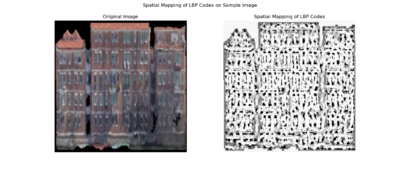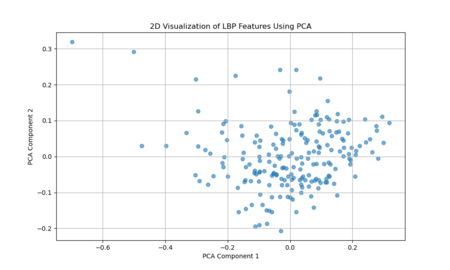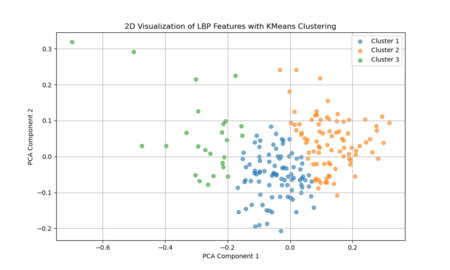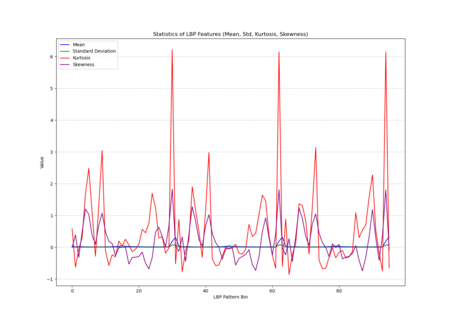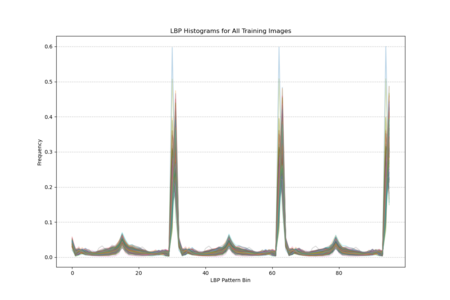Reconstruction of Partial Facades: Difference between revisions
| Line 190: | Line 190: | ||
=== Linking Feature Representations to MAE Reconstruction === | === Linking Feature Representations to MAE Reconstruction === | ||
Gabor Features: | |||
These features highlight repetitive, uniform texture patterns. Venetian facades often have recurring motifs—brick patterns, stone arrangements, or consistent color gradients. The Gabor analysis showed that the facades, in terms of texture frequency and orientation, vary along a mostly one-dimensional axis, suggesting a strong commonality. | These features highlight repetitive, uniform texture patterns. Venetian facades often have recurring motifs—brick patterns, stone arrangements, or consistent color gradients. The Gabor analysis showed that the facades, in terms of texture frequency and orientation, vary along a mostly one-dimensional axis, suggesting a strong commonality. | ||
Implication for MAE: | |||
Since MAEs learn to fill in missing patches by leveraging global context, regular and repetitive textures are easier to guess. If part of a patterned surface (like a uniform wall area) is masked, the MAE can infer what belongs there from the context it has learned. As a result, reconstruction errors on these uniform, texturally consistent regions are likely to be low. | Since MAEs learn to fill in missing patches by leveraging global context, regular and repetitive textures are easier to guess. If part of a patterned surface (like a uniform wall area) is masked, the MAE can infer what belongs there from the context it has learned. As a result, reconstruction errors on these uniform, texturally consistent regions are likely to be low. | ||
HOG Features: | |||
HOG captures edge distributions, corners, and the shapes formed by architectural details—think windows, balconies, ornate moldings, and decorative columns. The PCA results for HOG were more scattered, indicating that Venetian facades do not have a single dominant “type” of edge pattern, but rather a wide variety of distinct and intricate details. | HOG captures edge distributions, corners, and the shapes formed by architectural details—think windows, balconies, ornate moldings, and decorative columns. The PCA results for HOG were more scattered, indicating that Venetian facades do not have a single dominant “type” of edge pattern, but rather a wide variety of distinct and intricate details. | ||
Implication for MAE: | |||
Irregular, unique details are harder for the MAE to predict if they’re masked. Unlike repetitive textures, a unique balcony shape or an uncommon decorative element can’t be inferred as easily from nearby patches. The MAE may reconstruct something plausible in broad strokes but miss subtle intricacies, leading to higher error in these regions. | Irregular, unique details are harder for the MAE to predict if they’re masked. Unlike repetitive textures, a unique balcony shape or an uncommon decorative element can’t be inferred as easily from nearby patches. The MAE may reconstruct something plausible in broad strokes but miss subtle intricacies, leading to higher error in these regions. | ||
Revision as of 11:35, 18 December 2024
Introduction
Motivation
Venice's facades represent a remarkable heritage of artistic and architectural ingenuity, reflecting centuries of cultural evolution. However, despite advancements in digital documentation, many scanned images of these facades are incomplete or improperly captured, leading to gaps in their visual representation. This limits the potential for accurate digital analysis, visualization, and preservation of these iconic structures.
To address this challenge, this project explores the application of different models for reconstruction of incomplete facade images. Firstly, we tried to implement a Masked Autoencoder (MAE). MAEs are powerful tools for self-supervised learning, aiming at reconstructing missing portions of data by leveraging patterns learned from complete examples. By training the model on a dataset of complete Venetian facade images, we aim to develop a system capable of accurately filling in the missing regions of improperly scanned images. The second model we tried to implement was an NMF,...
Deliverables
link to the Github respository :
Project Timeline & Milestones
| Timeframe | Task | Completion |
|---|---|---|
| Week 4 |
|
|
| Week 5 |
|
|
| Week 6 |
|
|
| Week 7 |
|
|
| Week 8 |
|
|
| Week 9 |
|
|
| Week 10 |
|
|
| Week 11 |
|
|
| Week 12 |
|
|
| Week 13 |
|
|
| Week 14 |
|
Exploratory Data Analysis
To gain deeper insights into the architectural and typological properties of Venetian facades, we conducted a series of exploratory textural and color analyses, including Local Binary Patterns (LBP), Histogram of Oriented Gradients (HOG), Gabor filters, and color distribution examinations. These will provide supportive evidence for the choice of models, hyperparameters and error analysis.
Local Binary Pattern
Local Binary Pattern (LBP) encodes how the intensity of each pixel relates to its neighbors, effectively capturing small-scale variations in brightness patterns across the surface. For the facade, this means LBP highlights areas where texture changes—such as the edges around windows, decorative elements, or shifts in building materials—are more pronounced. As a result, LBP maps reveal where the facade’s texture is smooth, where it becomes more intricate, and how these features repeat or vary across different sections of the building.
The two-dimensional projection of LBP features via PCA suggests that the textural characteristics of Venetian facades span a broad and continuous range, rather than forming a few discrete, well-defined clusters. Each point represents the LBP-derived texture pattern of a given image region or facade sample, and their spread across the plot indicates variation in texture complexity, detailing, and material transitions. If there were strong, distinct groupings in this PCA space, it would imply that certain facade types or architectural features share very similar texture signatures. Instead, the relatively diffuse distribution implies that Venetian facades exhibit a wide spectrum of subtle texture variations, with overlapping ranges of structural and decorative elements rather than neatly separable categories.
The histogram plot, displaying LBP distributions for all training images, shows pronounced peaks at certain pattern bins rather than a uniform or random spread, indicating that specific local texture patterns are consistently prevalent across the facades. The statistical plot (mean, standard deviation, kurtosis, skewness) further reveals that these patterns are not normally distributed; some bins have notably high kurtosis and skewness, indicating that certain textures appear more frequently and in a more clustered manner than others. In other words, Venetian facades are characterized by stable, repetitive textural signatures—likely reflecting repeated architectural elements and material arrangements—rather than exhibiting uniformly varied surface textures.
Gabor Filter
Gabor filters capture localized frequency and orientation components of an image’s texture. The PCA projection resulting in a near-linear distribution of points suggests that variation in the Gabor feature space is largely dominated by a single principal direction or a narrow set of related factors. This could imply that Venetian facades have a relatively uniform textural pattern, strongly influenced by a consistent orientation or repetitive decorative elements. In other words, the facades’ texture patterns may be comparatively regular and structured, leading to a low-dimensional representation where one main factor (like a dominant orientation or repetitive structural motif) explains most of the variation.
histogram of oriented gradients (HOG)
Histogram of Oriented Gradients (HOG) features capture edge directions and the distribution of local gradients. The more scattered PCA plot indicates that no single dimension dominates the variability as strongly as in the Gabor case. Instead, Venetian facades exhibit a richer diversity of edge and shape information — windows, balconies, ornaments, and varying architectural details produce a more heterogeneous distribution of gradient patterns. This complexity results in a PCA space without a clear linear trend, reflecting more complexity and variety in structural features and contour arrangements.
In Summary:
Gabor Features: Suggest a more uniform, repetitive texture characteristic of Venetian facades, possibly reflecting dominant architectural rhythms or orientation patterns.
HOG Features: Highlight a more diverse set of edge and shape variations, indicating that while texture may be consistent, the facades have numerous structural details and differing configurations that result in a more dispersed feature representation.
Together, these indicate that Venetian facades are simultaneously texturally coherent (Gabor analysis) yet architecturally varied in their structural details (HOG analysis).
Methodology
This project is inspired by the paper "Masked Autoencoders Are Scalable Vision Learners" by He et al., from Facebook AI Research (FAIR). The MAE architecture is designed to reconstruct missing parts of an image, enabling effective self-supervised pretraining of Vision Transformers (ViTs). The central idea is to mask a substantial portion of input image patches and train the model to reconstruct the original image using the remaining visible patches.
For this project, two types of MAEs were implemented:
1) Custom MAE: Trained from scratch, allowing flexibility in input size, masking strategies, and hyperparameters.
2) Pretrained MAE: Leveraged a pretrained MAE, which was finetuned for our specific task.
Custom MAE
Data Preprocessing
Images were resized to a fixed resolution (e.g., 256×256) and normalized to have pixel values in the range [-1, 1] and the input image was divided into patches of size 8x8, resulting in a grid of 32x32 patches for each image.
Model Architecture
Encoder: The encoder takes visible (unmasked) patches as input and processes them using a Vision Transformer (ViT)-based architecture. Positional embeddings are added to the patch embeddings to retain spatial information. The encoder produces a latent representation for the visible patches.
Decoder: The decoder takes both the encoded representations of visible patches and learnable masked tokens as input. It reconstructs the image by predicting pixel-level details for the masked patches.
Masking Strategy
A contiguous block of patches is masked to simulate occlusion, which more accurately represents the incomplete facades in our data compared to a random masking strategy. A masking ratio of 50% was applied, meaning half of the patches in each image were masked during training.
Loss Function
To optimize the model, I used a combination of Masked MSE Loss and Perceptual Loss. The Masked MSE Loss, following the original MAE methodology, is computed only on the masked patches to encourage reconstruction of unseen regions. The Perceptual Loss, derived from a pre-trained VGG19 network, enhances reconstruction quality by focusing on perceptual similarity, also restricted to masked regions. The final loss is a weighted combination:
<math>\mathcal{L} = 0.6 \cdot \text{MSE Loss} + 0.4 \cdot \text{Perceptual Loss}</math>
Training and Optimization
The model was trained using the AdamW optimizer, with a learning rate scaled based on batch size and a cosine decay scheduler for gradual reduction of learning rates. A warm-up phase was incorporated to stabilize training during the initial epochs.
Evaluation Metrics
Performance was evaluated based on reconstruction quality (MSE + perceptual loss) and visual fidelity of reconstructed images.
Pre-Trained MAE
Results
custom MAE
The results obtained from training our custom MAE were not entirely satisfactory, as the reconstructed images appeared quite blurry and lacked fine-grained details, having difficulty recovering features like windows or edges. The original motivation for training the model from scratch was to have greater flexibility in the model architecture. By building a custom MAE, we aimed to tailor the model's design to the specific challenges of our dataset, such as the unique structure of incomplete facades and the need to experiment with different parameters like masking strategies, patch sizes, and embedding dimensions. This level of customization allowed us to explore architectural decisions that might better align with the characteristics of our data, compared to relying on a pretrained model with fixed design choices but a major limitation in this setup was the size of the dataset, which contained only 650 images of complete facades. Training a deep learning model like an MAE, especially from scratch, requires a much larger dataset to effectively learn meaningful representations. With such a small dataset, the model struggled to generalize, focusing on coarse, low-frequency features such as the overall structure and color distribution, rather than capturing finer details like edges, textures, and patterns.
While perceptual loss based on VGG19 features did improve the reconstruction quality, its impact remained constrained by the small size of the training set. The model began to recover higher-level patterns and global structures, but lacked the fine-grained detail that would be possible with more extensive training data.
To overcome these limitations, we opted to use a pretrained model instead of training from scratch. The pretrained model, fine-tuned on our specific dataset, leveraged learned representations from large-scale training on diverse data, allowing it to generalize much better. By building on the rich, low- and high-level features already embedded in the pretrained network, the fine-tuned model produced significantly sharper and more realistic reconstructions. In the next section, we will present the results obtained using this pretrained model, highlighting its improved performance compared to the custom MAE.
Error Analysis
Linking Feature Representations to MAE Reconstruction
Gabor Features:
These features highlight repetitive, uniform texture patterns. Venetian facades often have recurring motifs—brick patterns, stone arrangements, or consistent color gradients. The Gabor analysis showed that the facades, in terms of texture frequency and orientation, vary along a mostly one-dimensional axis, suggesting a strong commonality.
Implication for MAE:
Since MAEs learn to fill in missing patches by leveraging global context, regular and repetitive textures are easier to guess. If part of a patterned surface (like a uniform wall area) is masked, the MAE can infer what belongs there from the context it has learned. As a result, reconstruction errors on these uniform, texturally consistent regions are likely to be low.
HOG Features:
HOG captures edge distributions, corners, and the shapes formed by architectural details—think windows, balconies, ornate moldings, and decorative columns. The PCA results for HOG were more scattered, indicating that Venetian facades do not have a single dominant “type” of edge pattern, but rather a wide variety of distinct and intricate details.
Implication for MAE:
Irregular, unique details are harder for the MAE to predict if they’re masked. Unlike repetitive textures, a unique balcony shape or an uncommon decorative element can’t be inferred as easily from nearby patches. The MAE may reconstruct something plausible in broad strokes but miss subtle intricacies, leading to higher error in these regions.
Conclusion
Appendix
References
He, K., Chen, X., Xie, S., Li, Y., Dollár, P., & Girshick, R. (2022). Masked Autoencoders Are Scalable Vision Learners. Proceedings of the IEEE/CVF Conference on Computer Vision and Pattern Recognition (CVPR), 16000–16009. https://openaccess.thecvf.com/content/CVPR2022/papers/He_Masked_Autoencoders_Are_Scalable_Vision_Learners_CVPR_2022_paper.pdf
